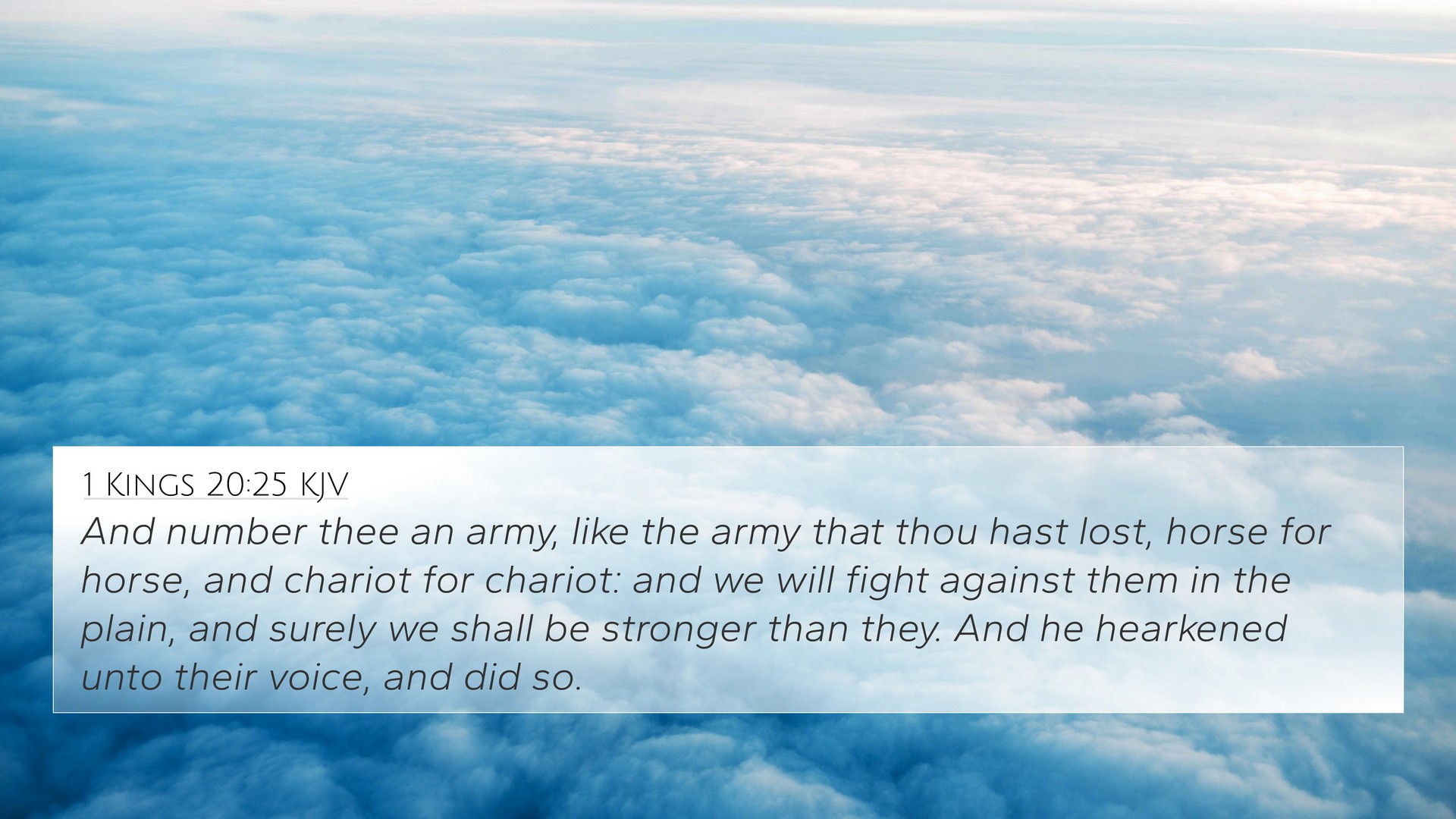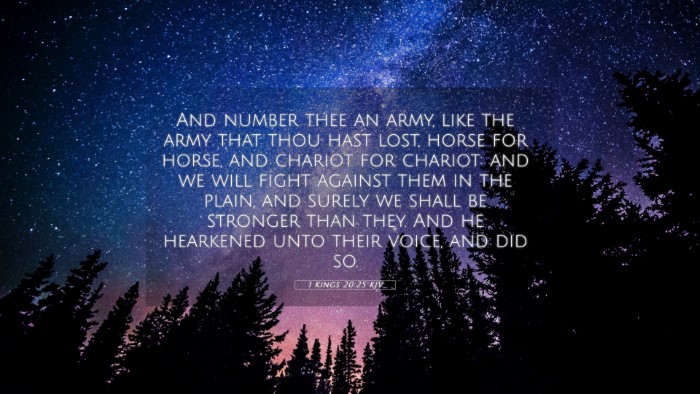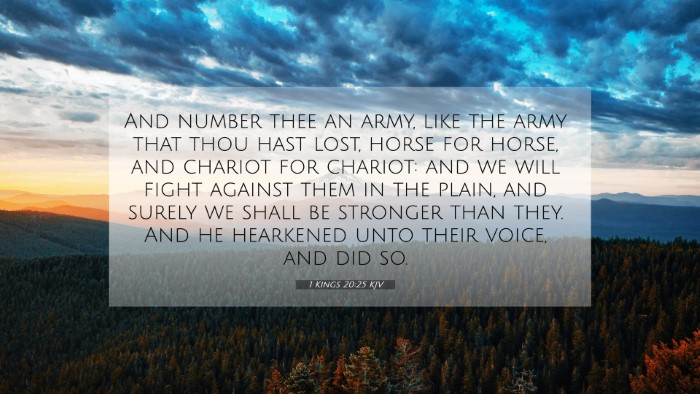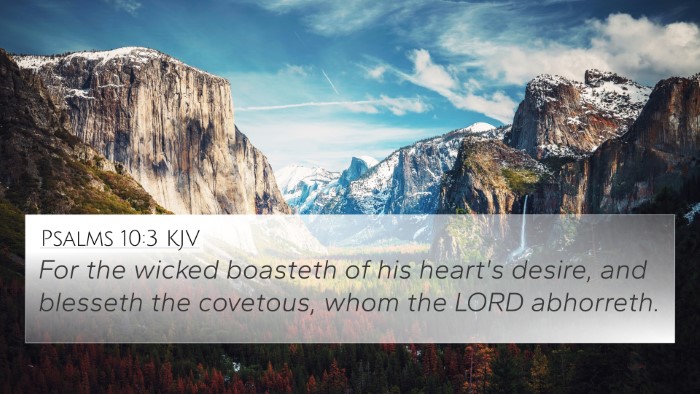Understanding 1 Kings 20:25
1 Kings 20:25 states: "And number thee an army, like the army that thou hast lost, horse for horse, and chariot for chariot: and we will fight against them in the plain, and surely we shall be stronger than they." This verse is a part of the narrative detailing King Ahab's conflicts with Ben-hadad, the king of Syria. Below, we explore the insights gathered from various public domain commentaries and connect them with relevant Bible verses.
Verse Meaning and Commentary Insights
This verse reveals strategic warfare and reliance on military strength as means to regain lost territory and power. The implications extend beyond mere physical battle to themes of divine providence, human effort, and the sovereignty of God in guiding the outcomes of conflicts.
-
Matthew Henry's Commentary:
Henry discusses this verse in terms of God's judgment on Israel and the arrogance of Ben-hadad. The call to muster an army mirrors the human tendency to rely on physical strength rather than turning to God. Henry encourages readers to reflect on where their own trust lies in times of battle.
-
Albert Barnes' Notes:
Barnes emphasizes the significance of Ben-hadad’s strategic advice. It denotes a temporary setback that can often precede a redemptive plan from God. This advice to mobilize a comparable force reflects the cyclical nature of conflict - without recognizing God’s ultimate authority, one may be led to overconfidence.
-
Adam Clarke's Commentary:
Clarke expounds on the notion of military strategies in scripture, showing the tension between human plans and Divine outcomes. He elaborates on how such conflicts often serve a greater purpose within the framework of scripture, leading to lessons about power dynamics and the nature of God’s will amidst human strife.
Relevant Cross-References
Understanding 1 Kings 20:25 can be enhanced by cross-referencing several related scriptures that highlight similar themes of military conflict, reliance on human strength versus divine intervention, and God's overarching plan.
- 2 Chronicles 20:15: "Thus saith the Lord unto you, Be not afraid nor dismayed by reason of this great multitude; for the battle is not yours, but God's." - Emphasizing God's control over battles.
- Isaiah 31:1: "Woe to them that go down to Egypt for help; and stay on horses, and trust in chariots, because they are many; and in horsemen, because they are very strong; but they look not unto the Holy One of Israel, neither seek the Lord!" - Warning against reliance on military strength.
- Psalms 20:7: "Some trust in chariots, and some in horses: but we will remember the name of the Lord our God." - A reflection on the futility of human strength compared to divine assistance.
- Proverbs 21:31: "The horse is prepared against the day of battle: but safety is of the Lord." - Reinforcing the theme of reliance on God for ultimate safety.
- Luke 14:31: "Or what king, going to make war against another king, sitteth not down first, and consulteth whether he be able with ten thousand to meet him that cometh against him with twenty thousand?" - Illustrating the necessity of strategic planning in conflicts.
- James 4:2: "Ye lust, and have not: ye kill, and desire to have, and cannot obtain: ye fight and war, yet ye have not, because ye ask not." - Highlighting the importance of prayer and divine help in human endeavors.
- Ephesians 6:12: "For we wrestle not against flesh and blood, but against principalities, against powers, against the rulers of the darkness of this world, against spiritual wickedness in high places." - A reminder that not all battles are physical, linking back to divine reliance.
Thematic Connections
The themes in 1 Kings 20:25 reflect the broader biblical narrative of conflict, reliance on God, and the dichotomy between human effort and divine sovereignty. This pattern is evidenced in both the Old and New Testament scriptures, encouraging an examination of how these connections enrich our understanding of faith and resilience.
Tools for Bible Cross-Referencing
To deepen your study of the connections present in scripture, consider utilizing these resources:
- Bible Concordance: A helpful tool for finding related verses based on keywords.
- Bible Cross-Reference Guide: A comprehensive list of themes and their scriptural counterparts.
- Bible Chain References: Links that help trace a line of thought through various scriptures.
- Bible Reference Resources: Tools designed for exploring thematic connections across the Bible.
Conclusion
Understanding 1 Kings 20:25 requires recognizing the interplay between human strategy and divine providence. The insights gathered from public domain commentaries illuminate how this verse serves as a crucible for examining faith in action, particularly in times of conflict.



